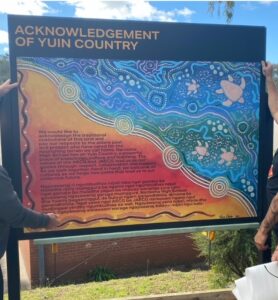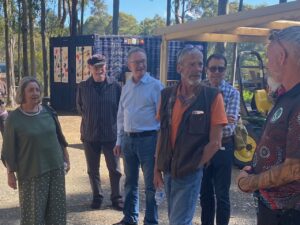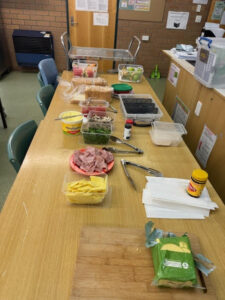by Laurel Lloyd-Jones | Mar 26, 2024 | Indigenous, NDESC, NEST, Projects

Today, EGS Trust directors Michael, Stuart, Sean and myself along with our new NDESC committee members Steve Payne, Kevin Bird, Tony Agnew and Angela Young (Associate Member EGST) – apologies from Linda Tucker, met with the Narooma High School (NHS) Executive Principal Fiona Jackson, Joseph Harper (Deputy Principal), Karen Ella-Bird (Snr Leader Indigenous Community Engagement), Shirlee-Maree Rowland (Head of Languages & Wellness and responsible person for the Breakfast Club), and other Indigenous staff members, Carl Taylor (Leader Student Support), Reece Ladmore (Student Support), and Daniel Mason Community Worker Red Cross).
This was a valuable and worthwhile meeting for everyone and we came away deeply impressed by the structures now in place at NHS that are based upon deep respect and caring for the students attending the school. It was so good to hear from Fiona and her committed team of staff members as they outlined how the school functions and their relationship with students who feel a close ownership of their school.
We heard how Fiona and other staff members meet the school buses each morning to welcome the students and how direction and decisions form, from the ground level upwards, with students having valuable input in decisions. I could see how the pride that these young Indigenous people have found in their school and education is now being transferred on to their family members and elders enabling healing and new understanding. This is bringing leadership out from within these students that is healing past attitudes and is enabling such potential and hope in going forward.
We all recognised how differently this school is approaching education to when we attended school. It affirmed for us the value and immense possibilities that our support for the planned mentoring program and the Breakfast Club will assist to enable even greater outcomes. Carl, who originates from the Northern Territory, spoke of how these boys of this age culturally, would be seen as young men. By respecting this aspect, it has evidentially shown that they react from a point of maturity. They step up to this higher role and this has brought forth greater cultural pride and respect in their culture.
We felt such a warm connection and inclusion in the hope that was very evident in our discussions today and we were welcomed warmly by the staff.
After our meeting we enjoyed a tour lead by Kevin, Carl, Daniel and Reece. Beginning with the outdoor Gardening/Nursery program that EGS Trust assisted with seed funding for this project. This is now about to be expanded to include traditional Indigenous plants that will enable traditional bush medicines to be produced. The girls have shown interest to pursue this under the direction and instruction of Elders.

I have asked for an update on this project and their planned future development as I feel that there will be ongoing interest and support for this from those people who previously lent their support to this project.
We heard about the Canoe Building project that is now available for the Indigenous boys. This is reviving and building close connection to culture enabled in the time spent in learning and in the sharing of life stories as they work. Carl spoke of how important this is for the boys to feel able to open up within a safe group and to discuss their inner emotions and feelings. Both the girl’s bush medicine and the boy’s canoe building programs are open to those non-indigenous students who wish to participate and this interest has grown. The emphasis is upon inclusiveness within the school.
Our tour took us on a walk to the boy’s (men’s) dancing circle set within the tall trees and the native plants which are abundant at the school. We saw the girl’s (women’s) yarning circle, learned of the higher ground placement of the boy’s yarning circle and the site of a combined circle between the two sites where they all can come together. These sites were created by the students under direction from contractors and teaching staff.
We learned that the school is sited on a Song Line and we felt the honour and respect that is given to this area. Narooma High School is one of the very rare schools today that does not have a high fence surrounding it. The freedom symbolised by this ‘unconfined’ school, which is situated within the natural environment, expresses hope so strongly. Today, we all witnessed the openness and enlightened approach that is alive and well at Narooma High School.
I am sure that we all felt very encouraged that our involvement with our Narooma and District Education Support Committee, in partnership with the committed staff at Narooma High School, will auger well for current and future students of the school.
Laurel Lloyd-Jones
25th March 2024

by admin | Mar 19, 2024 | NDESC, NEST, Projects
Can we support Narooma High School’s Breakfast Club to be sustainable into the future?

What is the Breakfast Club? Here is some background information that may assist.
- The Breakfast Club runs Monday – Friday from 8.00am – 8.45am
- Located in the Food Tech Classroom
- Caters for students who travel in by bus from Cobargo, Tilba, Bermagui, Bodalla, Dalmeny & Wallaga Lake. (It does not exclude Narooma resident students.)
- Buses arrive at school from 8.10am to 8.30am
- Attending staff set up food/equipment normally from 7.45am and repack/store from 8.45am
- ‘Menu’ is fruit, ham, cheese, mushroom, green leaf toasted sandwiches/wraps and berry/milo smoothies.
- Students make and toast their selection and make smoothies.
- Students wash their plates and utensils.
We use the activity as a soft engagement with students and observe if students are arriving at school in an emotional state (Monday is the high-risk morning). This follows through on completion of breakfast in identifying if the student has brought either a packed lunch or money to purchase lunch from the canteen. Staff intervene in a non-embarrassing way to arrange lunch should this be needed.
- In 2023 we averaged 18 – 20 students per morning – so far this year we are averaging 30- 35 per day. Multiple reasons lie behind this!
- Purchase of the food is undertaken by staff and funding comes from a range of ‘shavings’ from a range of sources within the school. In 2023 average purchase costs was $50.00 – $60.00 and currently it is now $80.00 – $90.00 per week.
- Food is purchased from Narooma Woolworths who offer a ‘discount’.
If you would like to make a small regular or one-off donation in support of this program this can be made through our Elm Grove Sanctuary Trust Project Account –
BSB: 032-766
Account Number: 13-9061
All donations are tax deductible. Please indicate that the funds are for the Breakfast Club program.
To enable us to receipt your donations please send an email to egstrust2@gmail.com


by admin | Dec 10, 2023 | Projects
Our Trust contributed significant financial support to the Moruya Microforest Project, and we are delighted to see that it is now flourishing in the grounds of St. John’s Common, Moruya.
To find out more about this and other Microforest Projects across NSW and the ACT, please see this article from the publication About Regional:
Microforest madness: How one woman’s little idea has grown across the country
by admin | Jun 1, 2020 | Projects
- We worked to bring change to government policy towards asylum seekers and to challenge the inhumane treatment of those held in Australian Detention Centres. Our Trust founded the Bega Valley Rural Australians for Refugees and the Bermagui-Narooma RAR. A proposal written by Sr Laurel and submitted to the Bega Valley Shire resulted in Bega becoming the first official ‘Welcome Town’ in Australia which offered an alternative model for a caring and humane approach to the processing of asylum seekers. Sr Laurel was invited to the U.S. to speak on this action to bring change. More information http://www.ruralaustraliansforrefugees.org.au
- The ‘Sydney Body Art Ride’ was held bi-annually over several years. The Elm Grove Sanctuary Trust sponsored this ride by providing book-keeping and accounting facilities. It was organised by our former Director, Jake Lloyd-Jones. This event involved a large group of people, adorned with body art, riding bicycles from Randwick to Maroubra Beach to raise funds for the Children’s Cancer Institute of Australia and to promote healthy, sustainable living. The aim was to support Sydney’s Mayor, Clover Moore’s vision for a viable system of cycle-ways for Sydney to offset the damaging effects of fossil fuels on our environment. The ride was an art project named the Human Rainbow, with painted volunteers riding in bands of colour, creating a human rainbow travelling to the sea. “The ephemeral ‘Human Rainbow’ aimed to be a devotional artwork for a secular, sophisticated community”- an art project of the SBAR organiser Jake Lloyd Jones (a Director of the Elm Grove Sanctuary Trust). For details of this former initiative see this link– Jake Lloyd-Jones
- Our Trust previously supported ‘Voice’, an independent quarterly of comment and review, published by Canberra’s Ginninderra Press, and edited by Bill Tully, Stephen Matthews and Ian McFarlane. Voice has now become an online publication. The EGS Trust supported Voice believing that it provided readers with a valuable resource enabling democratic, social, cultural and political comment. The editors organised public forums to reflect the theme of each issue. These were usually held in Canberra, however for two years the Elm Grove Sanctuary Trust sponsored a Voice forum in Bermagui on the far south coast of NSW. These forums ‘Apocalypse Postponed – Global sustainability in a world divided by terrorism, economic imperialism and predicted climate change’ were hugely successful. Two high-profile speakers Dr Carmen Lawrence MP and writer/activist Rosie Scott from PEN Australia and two local high-school senior students Sven Helland & Tiffany Hart provided excellent input. A fuller report can be found on our News and Articles page. For further information/subscriptions regarding Voice visit their website https://www.ginninderrapress.com.au/





